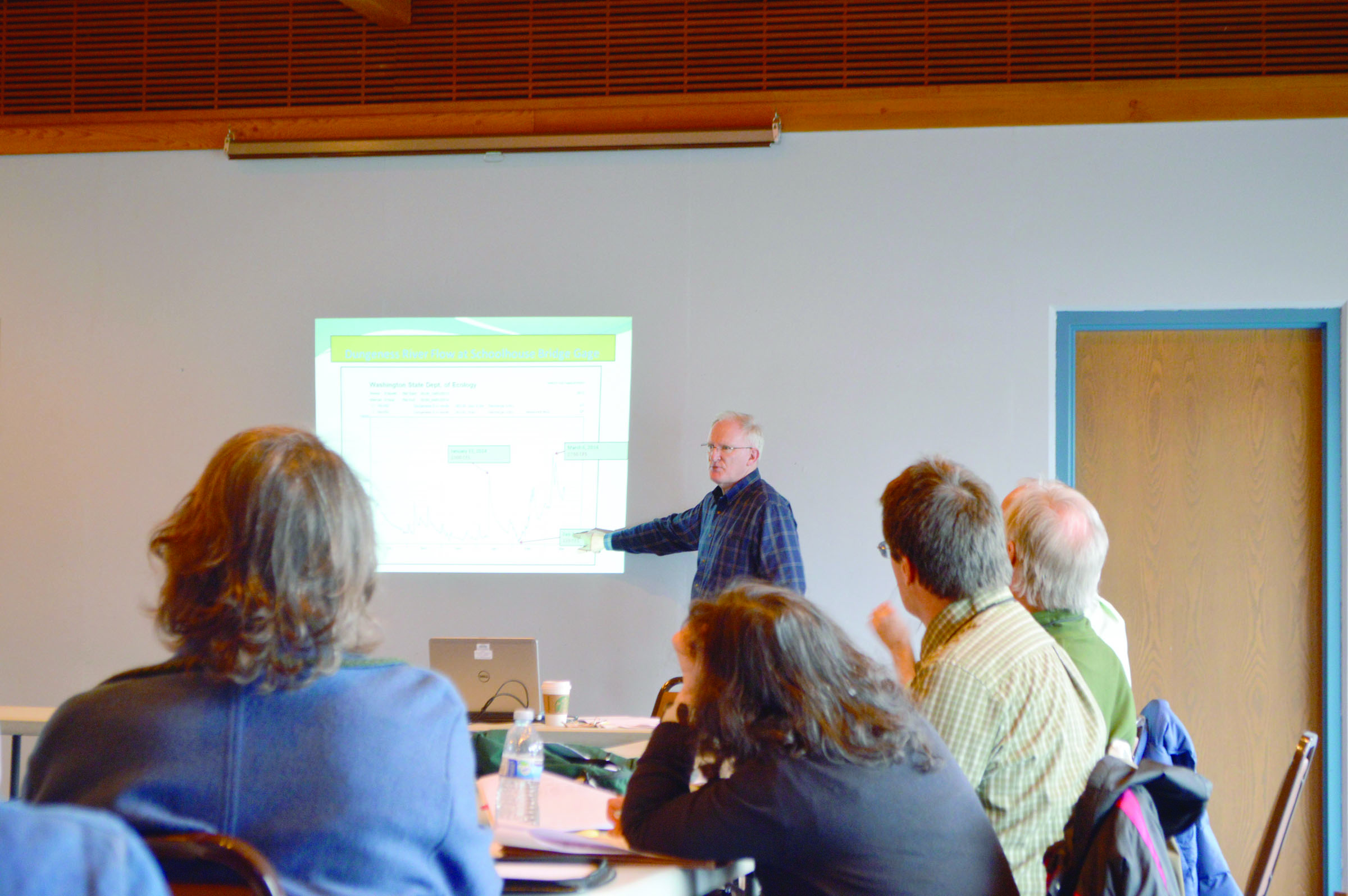SEQUIM –– Members of the Olympic Resource Protection Council said they plan to ask donors whether they should proceed in court to reverse a state Department of Ecology rejection of a request to rework the Dungeness water rule.
Ecology Director Maia Bellon rejected the council’s request Tuesday.
Greg McCarry, a member of the building industry-backed council, said the council has three options it could take in response.
“We can walk away, or we could ask the governor to overrule the rejection, which would be the same as walking away,” McCarry said Wednesday at a routine forum at John Wayne Marina that is scheduled every other month.
Attending the forum were two Ecology officials, Tom Loranger and Mike Gallagher, both working with water resources.
“The only option if we get the go-ahead to go further is litigation,” McCarry said.
The council, formed in October to seek amendments to the water rule, had asked Ecology to rework the rule that came into effect in January.
The council argued that Ecology misused a statutory justification known as “overriding consideration of public interest” when it set the minimum flow for the Dungeness Basin.
In her letter, Bellon said her agents could address many of the council’s concerns administratively.
“While Ecology is not granting your rulemaking petition, we are sincere in our commitment to improve the administrative process, enhance mitigation availability and minimize costs to individuals,” Bellon wrote.
Implemented Jan. 2, 2013, the water rule limits the amount of water that can be used from the river and its tributaries to keep it at a minimum level to support fish and existing human uses.
The Dungeness River is home to four fish species under the protection of the federal Endangered Species Act.
The rule covers the eastern half of Water Resource Inventory Area 18, from Bagley Creek to Sequim Bay.
Several local agencies wrote letters to Ecology in support of the council’s request, including Clallam County commissioners, Clallam County Community Development Director Sheila Roark Miller, Port of Port Angeles commissioners, the Port Angeles Regional Chamber of Commerce, the Clallam County Economic Development Council, the Port Angeles Business Association and the Sequim Association of Realtors.
The council’s petition cited an October ruling by the state Supreme Court that Ecology overstepped its bounds when it used the overriding-consideration-of-public-interest defense to justify allocating more water from the Skagit River watershed for use in the agricultural and building industries.
Bellon responded that the Dungeness water rule was different from the Skagit rule and that the Supreme Court’s ruling dealt with different circumstances than those in the Dungeness basin.
Sequim Attorney Kristina Nelson-Gross argued on behalf of the council that the court defined water reservations made under management rules to be de facto water rights to the river.
As such, she said, the water rule created a water right that goes above what is available in the river by unnecessarily limiting water use by property owners and businesses.
Bellon said the minimum flow level was set by a group of local interested parties who agreed upon what was necessary to protect the stream’s quality.
Realtor Marguerite Glover, who was heavily involved during the crafting of the water rule, challenged that at Wednesday’s meeting.
“There’s so much in here that’s just inaccurate,” Glover said.
“You’ve got this incredibly high bar set that the river is never going to meet.”
Glover said that flow was set by just four people on a committee that did not include any representation of rural landowners.
Gallagher, water resources manager for Ecology, said a flow of 105 cubic feet per second has been targeted for summer months and should be attainable thanks to conservation measures by the valley’s agricultural irrigators and by projects funded by the Legislature to add water back into the river basin.
The minimum flow set under the rule is 180 cubic feet per second. The target is a mark to gauge improvement.
Glover said neither number takes into account reduced usage of Dungeness Basin water by agricultural irrigators over the past several decades.
“In the ’70s, the irrigators were pulling out tons of water, way more water,” Glover said. “But there were fish there.”
Loranger, Ecology’s water resource program manager, said his agency has instructions to work with interested agencies from the basin to implement the rule in a beneficial way.
“We’ve got a huge investment here, and we want to make this work,” Loranger said Wednesday.
________
Sequim-Dungeness Valley Editor Joe Smillie can be reached at 360-681-2390, ext. 5052, or at jsmillie@peninsuladailynews.com.
